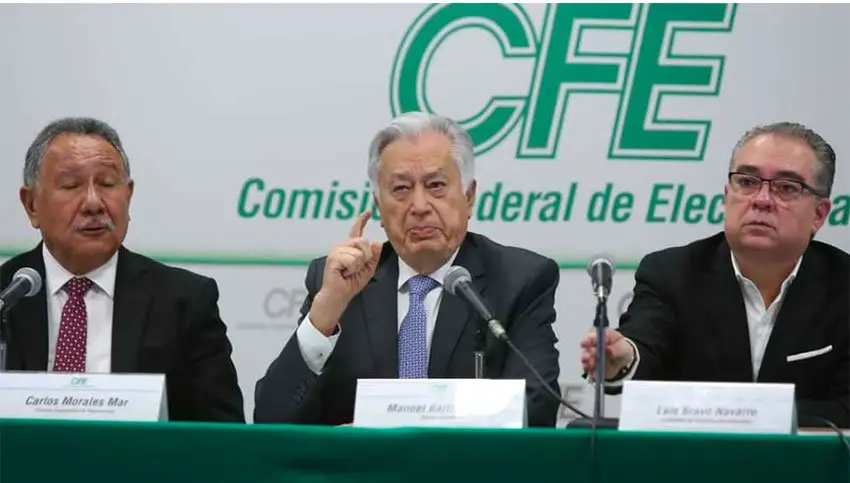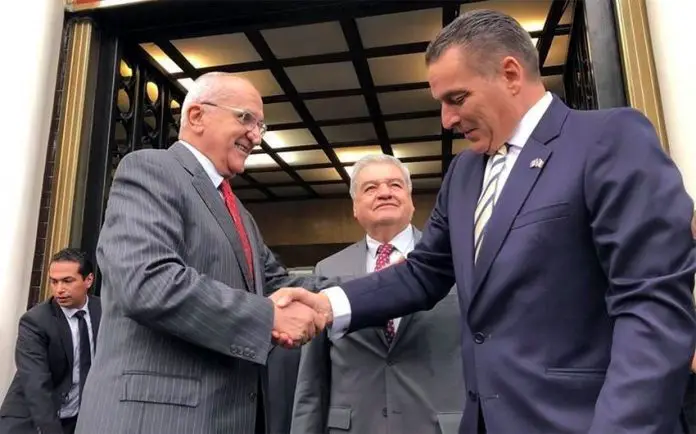Canada’s ambassador to Mexico has rejected a claim made by the chief of the Federal Electricity Commission (CFE) that the companies IEnova and TC Energy (formerly TransCanada) initiated an arbitration process related to the contract for the Texas-Tuxpan gas pipeline.
The CFE announced yesterday that it had filed requests for arbitration in courts in the United Kingdom and France to annul clauses in seven pipeline contracts, including that for the line between Texas and Tuxpan, Veracruz.
The commission said it wants to negotiate a “fairer” outcome to contract disputes.
Speaking at a press conference yesterday, CFE director Manuel Bartlett said the pipeline companies sought arbitration before the state utility.
“What did we do? We turned to the same [option] . . . We filed an arbitration request. They were the first to file an arbitration lawsuit, not us . . . They beat us to it but we didn’t get angry,” he said.

Asked about Bartlett’s claim on his way into an event to celebrate the 75th anniversary of diplomatic relations between Mexico and Canada, Ambassador Pierre Alarie responded:
“That’s not true. There is a difference between an amparo [injunction] and arbitration. The companies protected themselves [with an amparo] but they didn’t start an arbitration process.”
Alarie accused the CFE of being disingenuous about the arbitration process that seeks to nullify certain clauses in the contract for the US $2.5-billion Tuxpan-Texas gas pipeline, which was completed last month and has the capacity to move 2.6 billion cubic feet of natural gas per day.
“The CFE is only using part of the information and not all of the information,” he said. “There is a lot more information than what the CFE lets you believe.”
The ambassador charged that the state-owned company is generating confusion and uncertainty among investors and said it was regrettable that “it has been impossible to sit down and speak to the CFE.”
“I can guarantee that the Canadian companies are willing to look at the contracts, we’ve been waiting to negotiate for six months,” Alarie said.
He added that the Trans-Pacific Partnership agreement or the North American Free Trade Agreement could be used to resolve the dispute but acknowledged that wasn’t the current intention.
Alarie also said the situation could pose a threat to the ratification process for the new North American trade pact known as the USMCA.
“In Canada, there is consensus in the country for the agreement to be endorsed. I’m a little bit more worried about what could happen in the United States because in the Texas-Tuxpan consortium there is also an American company,” he said.
“We mustn’t give ammunition to people who oppose the treaty,” Alarie added.
Jesús Seade, foreign affairs secretary for North America, acknowledged at yesterday’s diplomatic event that there are “complex issues” to be resolved but expressed confidence that the parties will overcome their differences.
“I’m sure that no obstacle is insurmountable for two countries that not only share a regional neighborhood but are also partners and allies,” he said.
Carlos Salazar Lomelín, president of the Business Coordinating Council, a leading private sector group, said yesterday that an agreement had been reached with President López Obrador to establish a conciliation board “to try to reach a solution that benefits everyone.”
